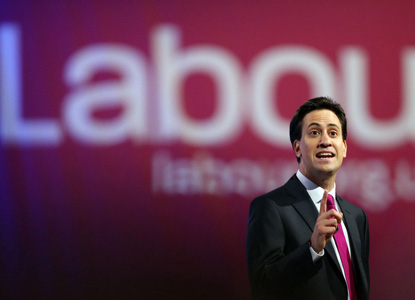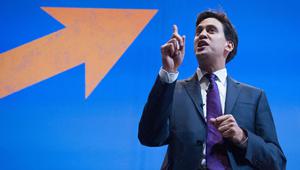By Richard Johnstone in Manchester | 2 October 2012
Labour leader Ed Miliband has warned that the party would have to make ‘tough' choices on public service spending if it won the next general election.

In his speech to the party conference today, Miliband told delegates that the government's economic policies had pushed the country back into recession.
He said a Labour government would be a ‘One Nation’ administration, but warned that the lack of economic growth meant there would need to be ‘many cuts’. This was because the coalition government had made public finances ‘worse not better’ by increasing borrowing despite its austerity plan.
‘Borrowing, the thing they said was their most important priority, the reason they were elected, is rising, not falling,’ Miliband told delegates.
‘Not because there hasn’t been pain and tax rises and cuts affecting every family in this country, not because they didn’t want to cut borrowing – they did, not because your services aren’t getting worse – they are, but because if you stop an economy growing, then it leaves more people out of work claiming benefits, not paying taxes, businesses struggle so they’re not paying taxes, and as a result borrowing goes up.’
However, he added that ‘because borrowing is getting worse, not better, there will be many cuts made by this government that we won’t be able to reverse, even when we would like to do so'.
He added: ‘In the next parliament we will have tough settlements for the public services and that will make life harder for those who use them and those who work in them.
'But here's the big difference between a one nation government led by me and this current government: those with the broadest shoulders will always bear the greatest burden.'
The Labour leader also reiterated his intention to repeal the government’s controversial changes to the NHS. He told delegates that he hated the Health and Social Care Act, which will abolish primary care trusts and replace them with clinical commissioning groups led by GPs.
He portrayed the government as ‘not understanding’ the NHS, and accused Prime Minister David Cameron of breaking his promise to not introduce a top-down reorganisation of the NHS.
‘It was a solemn contract with the British people. And then what did he do? He came along after the election and he proposed a top-down reorganisation that nobody voted for, that nobody knew about and nobody wanted,’ the Labour leader said.
‘Let me tell you what I hate about this reorganisation. I hate the waste; I hate the waste of billions of pounds at a time when the NHS has its most difficult settlement for a generation.
‘The next Labour government will end the free market experiment, it will put the right principles back at the heart of the National Health Service, and it will repeal the NHS Bill.’
Miliband also announced that the next Labour government would boost vocational education, introducing a new ‘technical baccalaureate’ for the 50% of young people who leave school and do not attend university.
Unison general secretary Dave Prentis said Miliband had ‘offered little hope to the millions of low-paid public service workers’ who are facing a pay freeze. ‘Until he can offer them hope, it will be difficult for them to vote Labour again,’ he added.
CBI director general John Cridland said he welcomed the focus on the ‘forgotten 50%’ who don’t go to university.
‘Business agrees with the importance of building an economy for all,’ he added.






















